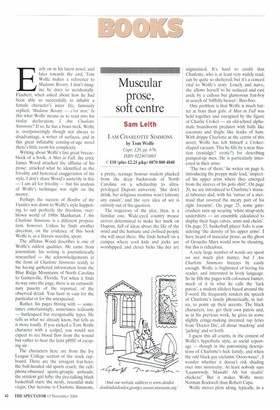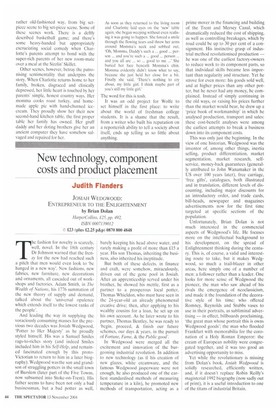Muscular prose, soft centre
Sam Leith
I AM CHARLOTTE SIMMONS by Tom Wolfe Cape, £20, pp. 676, ISBN 0224074865 ct £18 (plus £2.25 p&p) 0870 800 4848 Early on in his latest novel, and later towards the end, Tom Wolfe makes a reference to Madame Bovaty. I don't imagine he does so accidentally. Flaubert, when asked about how he had been able so successfully to inhabit a female character's inner life, famously replied, 'Madame Bovary — c'est moi.' Is this what Wolfe means us to read into his titular declaration, I Am Charlotte Simmons? If so, he has a brass neck. Wolfe is, overpoweringly though not always to disadvantage, a writer of surfaces, and in this great inflatable coming-of-age novel there's little room for complexity.
Writing about Wolfe's last great breezeblock of a book, A Man in Full, the critic James Wood attacked the afflatus of his prose; attacked what he identified as the frivolity and hysterical exaggeration of his style. I don't share Wood's austerity in this —I am all for frivolity — but his analysis of Wolfe's technique was right on the money.
Perhaps the success of Bonfire of the Vanities was down to Wolfe's style happening to suit perfectly the frivolous, overblown world of 1980s Manhattan. / Am Charlotte Simmons is a different proposition, however. Unless he finds another direction, on the evidence of this book Wolfe is, as a literary novelist, spent.
The afflatus Wood describes is one of Wolfe's oddest qualities. He came from journalism; his writing is journalistically researched — the acknowledgements at the front of Charlotte Simmons testify to his having gathered information from the Blue Ridge Mountains of North Carolina to Gainesville, Florida. Yet when it finds its way onto the page, there is an extraordinary paucity of the reported, of the observed detail. You hunt in vain for the particular or for the unexpected.
Rather, his pages throng with — sometimes entertainingly, sometimes tediously — burlesqued but recognisable types. He tells us what we already know, but tells us it more loudly. If you nicked a Tom Wolfe character with a scalpel, you would not expect to see blood flow from the wound but rather to hear the faint pfffft! of escaping air.
The characters here are from the Ivy League College section of the stock cupboard. There are the arrogant frat-boys; the bull-headed old sports coach; the cellphone-obsessed sports-groupie airheads; the strident girl lefty; the jive-talking black basketball stars; the nerdy, resentful male virgin. Our heroine is Charlotte Simmons, a pretty, teenage honour student plucked from the deep backwoods of North Carolina on a scholarship to ultraprivileged Dupont university. 'She don't drink, her religious momma won't tolerate any cussin', and the very idea of sex is entirely out of the question.
The trajectory of the plot, then, is a familiar one. Wide-eyed country mouse arrives determined to make her mark on Dupont, full of ideas about the life of the mind and the humane and civilised people she will meet there. She finds herself on a campus where cool kids and jocks are worshipped, and clever hicks like her are stigmatised. It's hard to credit that Charlotte, who is at least very widely read, can be quite so sheltered; but it's a conceit vital to Wolfe's story. Lonely and naive, she allows herself to be seduced and cast aside by a callous but glamorous frat-boy in search of 'hillbilly beaver'. Boo-hoo.
One problem is that Wolfe is much better at boys than girls. A Man in Full was held together and energised by the figure of Charlie Croker — an old-school alphamale boardroom predator with balls like coconuts and thighs like hocks of ham. With drippy Charlotte at the centre of this novel, Wolfe has left himself a Crokershaped vacuum. This he fills by a near fixation (nostalgic? erotic?) for describing pumped-up men. He is particularly interested in their arms.
'The two of them,' he writes on page 6, introducing the preppy male lead, 'inspected his upper arms where they emerged from the sleeves of his polo shirt'. On page 20, we are introduced to Charlotte's manual labourer dad, with his 'tattoo of a mermaid that covered the meaty part of his right forearm'. On page 25, some gatecrashers turn up wearing 'white strap-style undershirts — an ensemble calculated to display their huge calves, arms and chests'. On page 53, basketball player JoJo is considering 'the density of his upper arms'. I have heard of muscular prose, as the ghost of Grouch() Marx would now be shouting, but this is ridiculous.
A very large number of words are spent on not much plot matter, but I Am Charlotte Simmons breezes by easily enough. Wolfe is frightened of boring his reader, and interested in lively language. So he fills the pages with coloratura banter, much of it in what he calls the 'fuck patois', a student idiolect based around the F-word. He frequently renders the speech of Charlotte's family phonetically, in italics, to point up their accents. The black characters, too, get their own patois and, as in his previous work, he gives us some slightly cringe-making invented rap lyrics from 'Doctor Dis', all about `macking' and 'jacking' and so forth.
guess this all counts, in the context of Wolfe's hyperbolic style, as social reportage — though in the patronising descriptions of Charlotte's hick family, and when the odd black guy exclaims `O000-weeer, I wonder whether it doesn't risk shading over into minstrelsy. At least nobody says `Laaawwwdy, Massah! Ah bin stealin' chickens!' But it makes Wolfe more Norman Rockwell than Robert Capa.
Wolfe moves plots along, typically, in a rather old-fashioned way, from big setpiece scene to big set-piece scene. Some of these scenes work. There is a deftly described basketball game; and there's some heavy-handed but appropriately excruciating social comedy when Charlotte's parents attempt to bond with the super-rich parents of her new room-mate over a meal at the Sizzlin' Skillet.
Other scenes, however, betray the patronising sentimentality that underpins the story. When Charlotte returns home to her family, broken, disgraced and clinically depressed, her little heart is touched by her parents' simple, honest country ways. Her momma cooks roast turkey, and homemade apple pie with hand-churned icecream. They proudly show her their new second-hand kitchen table, the first proper table her family has owned. Her gruff daddy and her doting brothers give her an ancient computer they have somehow salvaged and repaired for her.
As soon as they returned to the living room and Charlotte laid eyes on the 'new' table again, she began weeping without even realising it was going to happen. She forced a smile through the flowing tears and threw her arms around Momma's neck and sobbed out, 'Oh, Momma, Daddy's such a ... good ... person ... and you're such a ... good ... person ...
and you all are ... so ... good to me She buried her face beneath Momma's chin. Momma evidently didn't know what to say, because she just held her close for a bit. Finally she said, 'There's nothing to cry about, my little girl. I think maybe part of you's still my little girl.'
The word for this is tosh.
It was an odd project for Wolfe to set himself in the first place: to write about the world of freshman college students. It is a shame that the result, from a writer who built his reputation on a reporterish ability to tell a society about itself, ends up telling us so little about anything.



























































































 Previous page
Previous page